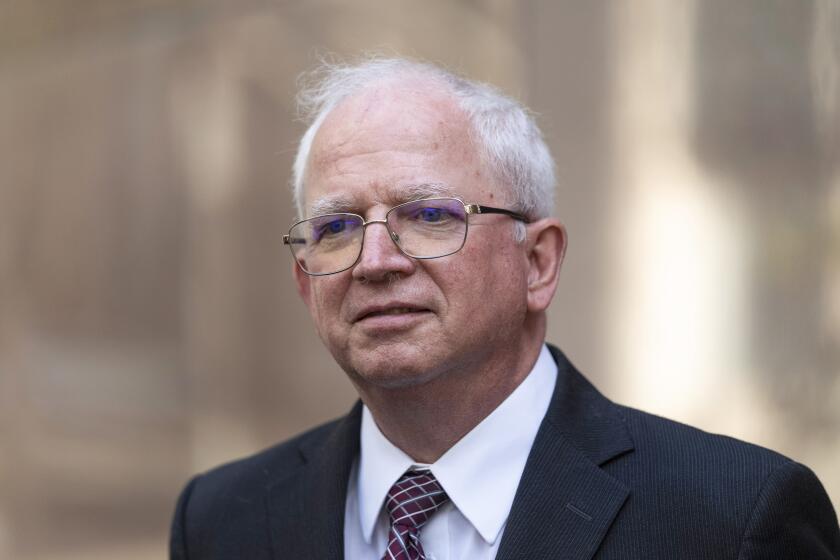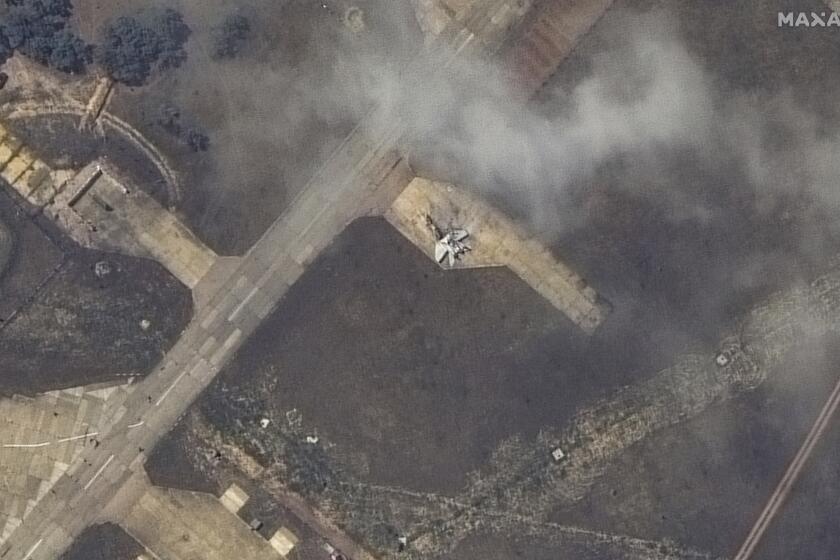In Sarajevo, a Wintry Chill Has Crept Into Civic Spirit : Balkans: The pride that’s sustained Bosnia’s besieged capital for 2 1/2 years is eroding. Hopelessness is on the rise.
Ana Ivanovich reached into her sewing basket and pulled out a pair of red wool slippers buried beneath a bundle of unfinished knitting.
“These are for you,” she told a friend, her eyes welling with tears. “You’ll need them when it gets colder.”
Ivanovich is leaving Sarajevo. She is one of countless exhausted and fed-up residents unable to bear the thought of another winter at war. Her hands are swollen from hauling jugs of water and stacks of firewood to her hillside apartment near the Zetra stadium, site of the 1984 Olympic ice skating competition. She complains of nightmares and torturous bouts of depression.
“I only knit now for those I love,” the 53-year-old preschool teacher said as she stroked the beginnings of a sweater she stopped knitting a year ago. “I just don’t have any interest anymore. I am tired. Tired of waiting for something to happen.”
Food in Sarajevo is more plentiful, utilities more regular and streets more tranquil now than in winters past. But the people of this besieged city are finding it difficult to muster the will to carry on. Sadly, modest improvements in everyday life, such as occasional running water and electricity, have become a source of anguish themselves--a painful reminder of how dismal the routine in this once-thriving city has become.
“This war is lasting too long. Everyone thought it would be over by now,” said Bakir Arnautovic, a young father who works at a downtown food pantry, one of about 100 set up by the Bosnian government to distribute humanitarian relief. “People are burning their cupboards and closets to stay warm. We are a proud people, but we can’t take this forever.”
Sarajevans have long felt abandoned by the world in their struggle to ward off the Bosnian Serb siege of their city--now in its 30th month.
But residents and relief officials say the sense of helplessness and hopelessness has never been greater as the population hunkers down for a third winter at gunpoint.
“People ask me for advice, and I say, ‘Get out of here,’ ” said Kris Janowski of the Office of the U.N. High Commissioner for Refugees, which provides 200 tons of humanitarian relief to the city each day. “What little dignity was left here has been taken away.”
But getting out is not easy. The Bosnian army needs soldiers to fight the war, and the Bosnian government needs civilians to broker peace. Without the 340,000 people trapped here, the Bosnian Serb stranglehold on Sarajevo would command less international sympathy, most likely putting the outgunned Muslim-led Bosnian forces in further peril.
“The Bosnian government does not want people getting out. That is a fact,” a U.N. official said.
Residents fortunate enough to win permission to leave speak in hushed tones of their plans, fearful that talk of their pending departure may somehow jeopardize it. Ivanovich has told only her closest friends, some of whom have kept their own plans to themselves. Last month, one friend left unannounced just a day after the two women met for an afternoon.
“A ticket out is the hottest commodity in town,” Janowski said. “I don’t know anybody who wouldn’t want to leave if they could.”
It took Ivanovich almost a year to collect the necessary papers, which include a passport, authorization from the Bosnian military, a transit visa to cross neighboring Croatia and permission to use a heavily fortified tunnel near the airport that feeds into friendly territory outside town.
Even with the proper documents, the route is so precarious that trips are organized on short notice, only to be canceled at the last minute.
Ivanovich has been left stranded several times and now keeps a bag near the front door packed with clothes and family photos. The trip out of Sarajevo will cost her about $100, a huge sum she can afford only because her son, a truck driver in Germany, has sent her the money.
“I will worry about my mother,” the widow said, gesturing toward an elderly woman huddled in front of a gas stove in the next room. “I’ve tried to talk her into coming too, but she won’t leave. But I won’t miss anything else about Sarajevo.”
Times have been tough--even tougher--before. But residents say the city has lost much of the solidarity and camaraderie that carried it through past ordeals. The hope and optimism of last spring, when agreements were struck to end two years of intense shelling of the city, have given way to desperation and disappointment as Bosnian Serb snipers continue to terrorize residents, shoot at relief airplanes and threaten to throw out U.N. peacekeepers.
On a recent afternoon, snipers killed one man and wounded 11 others, including several children, when they opened fire on a streetcar traveling on the city’s major thoroughfare.
Last month, Bosnian Serb forces shelled the city, killing two people and wounding 18, in response to a Bosnian government front-line assault outside Sarajevo. Day after day, gas and electricity supplies, both controlled by the Bosnian Serbs, serve as bargaining chips in the high-stakes military standoff, going on and off as relations warm and cool.
Not long ago, such hardships served to unify the beleaguered population; now they mostly reinforce the despair.
“We are just trying to survive, to get by the best we can,” said Dzana Kapa, a 22-year-old college student who works as a translator for the U.N. Protection Force, which has 5,000 peacekeepers in the city. “People don’t have the luxury to worry about anything else.”
Much of the plunge in civic spirit was inevitable, some say, because the population of Sarajevo has changed dramatically in just two years. At least 100,000 residents have fled the city since the start of the war, replaced by tens of thousands of refugees from other parts of Bosnia that are now under Serbian rebel control. Some native Sarajevans say they barely recognize their own neighbors.
But Hasan Karacic, a retired auto mechanic who was forced from his home near Sarajevo’s airport at the start of the war, said the change in attitude cannot be blamed only on uncaring newcomers.
Karacic was digging a hillside vegetable patch with a hammer and small ax last week outside his tiny apartment, which he and his wife moved into two months ago after two years of searching for a new home. None of Karacic’s neighbors--several of whom had planted gardens on the same hillside--would lend him gardening tools.
“Nobody cares about you anymore,” he said as he struggled to hollow a trench for spinach and onion seeds. “I just don’t feel the friendship I used to feel. When you walk down the street and see someone you know, they just pass by. At the beginning of the war, everyone was helping each other. It is not the same city anymore.”
Karacic stood beneath a towering birch tree, which he had already sized up as possible firewood this winter. He and his wife live on a $1-a-month pension, U.N.-supplied flour, sugar and oil, and scraps of food she brings home from an unpaid job at the hospital across the street.
There certainly will be no money for firewood this winter, Karacic said, but he held out little hope of burning the birch tree to keep warm. His ax is too small to fell the tree, he explained, and he won’t even bother asking anyone to lend him a larger one.
More to Read
Start your day right
Sign up for Essential California for news, features and recommendations from the L.A. Times and beyond in your inbox six days a week.
You may occasionally receive promotional content from the Los Angeles Times.






